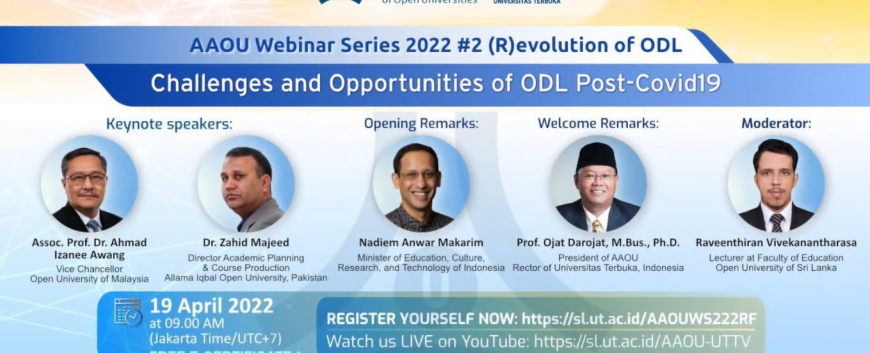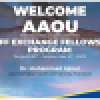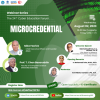- Posted by Anonymous (not verified)
- 19 Apr 2022
- INTERNASIONAL
- Total View 0
Minister Nadiem Makarim in Webinar AAOU #2: Freedom to Study-Independent Campus as Forms of Innovation and Acceleration of Higher Education Quality
After organizing its first webinar in March, the webinar of the Asian Association of Open Universities (AAOU) was again held with the theme of: Challenges and Opportunities of ODL Post-Covid19. This webinar was held online via Zoom and broadcasted live online on YouTube UT TV channel. The program was watched not only by the local viewers, but also by foreign viewers, such as Malaysia, Pakistan, Sri Lanka, Korea, and other Asian countries.
As we all know when the pandemic Covid-19 started, all activities that used to be done face-to-face now have to be done online, including in education. Gradually, almost all activities are back to normal in this new normal era and we enter the post-pandemic era. The learning methods in schools or universities which were once online, are now back to face to face.
For the Association of Open Universities (AAOU) as one institution that applies ODL (Open and Distance Learning) or in Indonesian it is termed Pendidikan Terbuka dan Jarak Jauh, it would certainly create new challenges and opportunities. In order to discuss such matters, this webinar invited two speakers, namely Assoc. Prof. Dr. Ahmad. Izanee Awang, Vice Chancellor of Open University Malaysia (OUM) and Dr. Zahid Majeed, Director of Academic Planning and Course Production, Allama Iqbal Open University Pakistan. The program was led by Vice Rector for Institutional Development and Partnership, Indonesia Open University or UT as well as the Secretary General of AAOU, Rahmat Budiman, M.Hum., Ph.D. and moderated by Raveenthiran Vivekanantharasa, Lecturer at Faculty of Education, Open University of Srilanka.

The program was first opened by the remarks of Minister of Education, Culture, Research, and Technology (Kemdikbudristek), Nadiem Anwar Makarim. In his speech, he addressed, “The pandemic Covid-19 that has changed the student’s learning methods drastically which used to involve the personal interaction and face-to-face meeting, then all have to be done online. Hence, for most campuses, it demanded them to make long and difficult adaptation, and it shows that the education in Indonesia is not ready to deal with swift changes in global scale,” said Mister Nadiem.
According to the Minister, good experiences and practices that Indonesia Open University or Universitas Terbuka (UT) possesses can be shared with others for the development of more flexible and accommodating learning system for the students. This experience can be a self-reflection in order make new innovation, by always looking ahead to the future, preparing both university students and university lecturers to have better capability and knowledge that are ever increasingly demanded in the future. The Ministry of Education, Culture, Research, and Technology also makes some innovations, break-throughs, and accelerations in education quality, one of which is “Freedom to Study and Independent Campus or Merdeka Belajar, Kampus Merdeka.”
“In addition, currently the quality of universities is assessed by Key Performance Indicators (KPI) or Indikator Kerja Utama (IKU), and therefore, not only do the university students make the innovation by studying off-campus, but also the campus university lecturers need to be motivated to learn and grow by doing their activities outside the campus, such as apprenticeship in the relevant industries or by doing the researches in other universities,” expressed Minister of Education, Culture, Research, and Technology. “Inter-institutional science and knowledge exchange is one form of mutual learning and doing things together in innovation and transformation into better directions and it needs to be utilized by UT for developing more flexible education by giving the priority to the quality,” as Minister continued. He added that the key to the successful growth of Universitas Terbuka is that the campus gives the freedom to the university students and lecturers to continue to develop themselves and innovate.
UT’s Rector, as well as the President of AAOU, Prof. Ojat Darojat, M.Bus., Ph.D., in his address expressed his gratitude to the Minister, the presenters, and the moderator who were present in the webinar. He hopes that a seminar like this would be able to give some insights and knowledge related to the issues in education, particularly in distance learning. As we all know, the world has gradually recuperated from the pandemic Covid-19. The theme brought forward this time is the continuation of the previous webinar, which is “the ‘Shape’ of ODL Post-Covid19.” In this series, the webinar discussed challenges and opportunities that distance learning has when we are back to normal in post-Covid-19.
Prof. Ahmad Izanee Awang, Vice Councilor of the Open University of Malaysia, who has more than 30 years of experience in education and management, expressed his views that the era of post-pandemic Covid19 required the preparedness of ODL practitioners that include to ensure the quality of education again, which is transferring to micro-credentials (short-term courses) up to the utilization of digital marketing so that more people will know them better.
According to Dr. Zahid Majeed, Director of Academic Planning & Course Production of Allam Iqbal Open University Pakistan, the challenges that will be faced during the post-pandemic Covid-19 are technology literacy, internet connection to the less printed learning materials. Nonetheless, behind all these, there are some opportunities that are achievable, such as learning activities that can be done virtually. He reminded us that in addition to that, with all the distance learning activities that are done online, the issues on data security need some attention.






